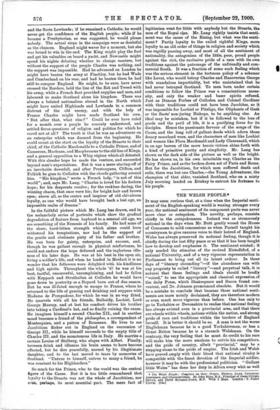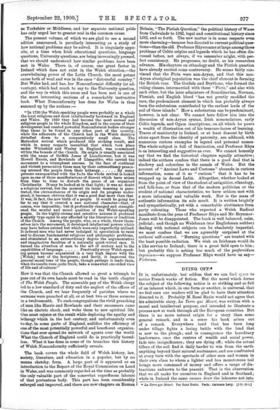THE WELSH PEOPLE.*
IT may seem curious that, at a time when the Imperial senti- ment of the English-speaking world is waxing stronger every year, the national sentiment of its component parts was never more clear or outspoken. The novelty, perhaps, consists chiefly in the outspokenness. Ireland was as strenuously national in the days when Mr. Butt gently wooed the House of Commons to mild concessions as when Parnell taught his countrymen to give raucous voice to their hatred of England. Wales has always preserved its national feeling, though it is chiefly during the last fifty years or so that it has been taught how to develop and emphasise it. The sentiment existed ; it only needed the stimulus of the revived Eistedhfod, of a national University, and of a very vigorous representation in Parliament to bring out all its latent ardour. In these days of "literary abounding "—if the abundance can with any propriety be called "literary "—and perpetual talk, it is natural that these feelings and ideals should be loudly "voiced," to use the appropriate and classical expression of the daily Press, which Shakespeare and Bacon found con- venient, and Dr. Johnson pronounced obsolete. But it would be a mistake to conclude that because those national senti- ments are more noisily declaimed, they are therefore modern or even much more vigorous than before. One has only to go to Yorkshire or Devonshire to realise that national feeling has always existed even in a provincial area, and that there are wheels within wheels, nations within the nation, and strong pride of race and traditions within the borders of England herself. It is better it should be so. A man is not the worse Englishman because he is a good Yorkshireman, or less a Great Briton because he is a staunch Welshman. On the contrary, the very feeling that he must do credit to his race will make him the more emulous to outvie his competitors, and the pride of country, albeit "provincial," may be a stepping-stone to the pride of empire. The Irish and Welsh have proved amply with their blood that national rivalry is compatible with the finest devotion of the Imperial soldier, however it may be with the professional politician. "Gallant little Wales" has done her duty in Africa every whit as well • The Welsh People : Chapters on their Origin, History, Laws, Language, Literature. and Characteristics. By John Rhys, MA., Principal of Jeans College, Oxford, and David Brynmor-Jones, M.P. With 2 Maps. London; T. Fisher Unwin. [16a3
as Yorkshire or Middlesex, and her separate national pride has only urged her to greater zeal in the common cause.
The present volume, of which we are glad to see a second edition announced, is peculiarly interesting as a study of how national problems may be solved. It is singularly appo- site, at a time when Irish educational questions, language questions, University questions, are being increasingly pressed, that we should understand how similar problems have been met in Wales. There is, of course, one great factor in Ireland which does not exist in the Welsh situation,—the overwhelming power of the Latin Church, the most potent cause both of weal and woe in the once "distressful country." But Wales had, and has, her Nonconformist difficulty (or ad. vantage), which had much to say to the University question, and the way in which this arose and has been met is one of the most interesting sections of a remarkably instructive book. What Nonconformity has done for Wales is thus summed up by the authors :—
"In 1730 the Welsh-speaking people were probably as a whole the least religious and most intellectually backward in England and Wales. By 1830 they had become the most earnest and religious people in the whole Kingdom, and in the course of their development had created powerful Nonconformist bodies stronger than those to be found in any other part of the country, while the adherents of the Church had in the Welsh districts dwindled down to a comparatively small class. The Methodist revival which produced this striking result, and which in many respects resembled that which took place under Whitefield and Wesley in England, was commenced within the bounds of the Church. Its origin is usually associated with the name of Griffith Jones of Llandhowror, but it was Howell Harris, and Rowlands of Llangeitbo, who carried the movement to a triumphant success. In the face of continual and violent persecution those men by their extraordinary preach- ing aroused the people from their lethargy By many persons unacquainted with the facts the whole revival is looked upon as one of those manifestations of dissent which have arisen from time to time to disturb the peace of an organised Christianity. It may be looked at in that light; it was no doubt a religious revival, but the moment its inner meaning is pene- trated, the circumstances of its origin and its progress under- stood, it becomes obvious that it was a good deal more than that It was, in fact, the new birth of a people. It would be going too far to say that it created a new national character—that, of course, was itnpossible ; but it profoundly changed and strength- ened the mental and moral qualities of the Welsh-speaking people. In the highly-strung and sensitive natures it produced a saintly 4-.3-pe equal to any afforded by the literature or tradition of the Church. Among the people, who, as a whole, threw them- selves into the movement, it developed intellectual powers which may have before existed but which were only imperfectly utilised. It induced men who had never indulged in speculation to raise and to discuss fundamental religious and philosophic problems, and stimulated to an extraordinary degree the argumentative and imaginative faculties of a naturally quick-witted race. It turned the attention of men to the art of oratory and to the capabilities of language Practically every Welsh-speak- ing person became acquainted in a very high degree with the [Welsh.] text of the Scriptures ; and lastly, it improved the general moral tone of the people, though perhaps it made them, when its results were quite fresh, take a somewhat one-sided view of life and of culture."
How it was that the Church allowed so great a triumph to pass out of its own hands must be read in the tenth chapter of The Welsh People. The miserable pay of the Welsh clergy led, to a low standard of duty and the neglect of the offices of the, Church, and we hear frequently of parishes where no sermons were preached at all, or at best two or three sermons in a twelvemonth. To such congregations the vivid preaching
of men like Harris and Rowlands and their successors came like an electric shock, and woke them to new spiritual life. One must rejoice at the result while deploring the apathy and lethargy which in. the last century, and unfortunately even to-day, in some parts of England, nullifies the efficiency of one of the most pol-Pntially powerful and beneficent organisa- tions that ever spread its network of agents over the world. What the Church of England could do is practically bound- less. What it has done in some of its branches this history of Welsh Nonconformity sufficiently reveals.
The book covers the whole field of Welsh history, law, society, literature, and education in a popular, but by no means sketchy, form. A large part of it appeared as an introduction to the Report of the Royal Commission on Land in Wales, and was commonly regarded at the time as probably the only valuable part of the somewhat superfluous labours of that portentous body. This part has been considerably enlarged and. improved, and there are new-chapters on Roman Britain, "The Pictish Question," the political history of Wawa from Cadwaladr to 1282, legal and constitutional history since 1282, and so forth. The new matter is in some respects even more charming—because less directed to current political ques- tions—than the old. Professor Rhys roams at large among those problems of Celtic origins and legends which he has often dis- cussed before, not always, if we remember aright, with per- fect consistency. He progresses, no doubt, as his researches advance. His chapters on ethnology and the Pictish question have already excited some controversy. He seems fairly con- vinced that the Picts were non-Aryan, and that this non- Aryan aboriginal population was the chief element in forming the British race. The Goidels and Brythons, who formed the ruling classes, intermarried with these "Picts," and also with each other, but the later admixture of Scandinavian, Norman, Flemish, and English blood "has not greatly modified the race, the predominant element in which has probably always been the substratum contributed by the earliest lords of the soil of these islands." How a substratum can be predominant, however, is not clear. We cannot here follow him into the discussion of non-Aryan syntax, Irish nomenclature, early Celtic legends, and Ogam inscriptions, on all which he pours a wealth of illustration out of his treasure-house of learning. Traces of matriarchy in Ireland, or at least descent by birth alone apart from the identity of paternity, are adduced, with numerous curious examples in legend and personal names. The whole subject is full of fascination, and Professor Rhys is as interesting and suggestive as ever. We cannot honestly say that we find the historical chapters equally attractive ; indeed the authors confess that there is a good deal that is shadowy and colourless in the annals of Wales. But the account of "Ancient Laws and Customs" abounds in curious information, some of it so " curious " that it has to be wrapped up in decent Latin. Altogether, whether looked at from the point of view of the student of antiquities, ethnology, and folk-lore, or from that of the modern politician or the student of national characteristics, we have seldom met with a more informing and valuable work. Nor is the mass of authentic information its sole merit. It is written brightly and sympathetically, yet with a remarkable abstinence from party colouring. Those who expected a Welsh Radical manifesto from the pens of Professor Rhys and Mr. Brynmor- Jones will be disappointed. The book is well balanced, calm, judicial ; and though no Welshman (nor Englishman neither) dealing with national subjects can be absolutely impartial, we must confess that we are agreeably surprised at the authors' self-control. "Burning questions " are treated with the least possible radiation. We wish an Irishman would do a like service to Ireland ; there is a great field open to him ; but probably this is asking too much of the perfervicium ingenium—we suppose Professor Rhys would have ua say- Pictorzon.







































 Previous page
Previous page